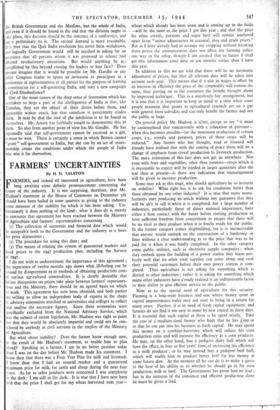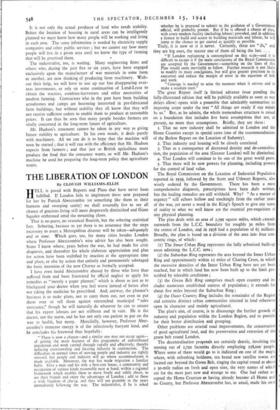FARMERS' UNCERTAINTIES
By H. D. '!tALSTON
ARMERS, and indeed all interested in agriculture, have been r long awaiting some definite pronouncement concerning the future of the industry. It is not surprising, therefore, that Mr. Hudson's statement in the House of Commons on December 5th should have been hailed in some quarters as giving to the industry some measure of the stability for which it has been asking. Un- fortunately it does nothing of the kind: what it does do is merely to announce that agreement has been reached between the Ministry of Agriculture and farmers' representatives concerning (t) The collection of economic and financial data which would be acceptable both to the Government and the industry as a basis for price discussions ;
(a) The procedure for using this data ; and (3) The means of relating the system of guaranteed markets and fixed prices to the 1947 production plan, including the harvest of 1947.
I do not wish to underestimate the importance of this agreement ; the experience of twelve months ago shows what ill-feeling can be caused by disagreement as tO methods of obtaining production costs of various agricultural commodities. It is dearly desirable that before discussions on prices take place b.etween farmers' representa- tives and the Ministry, there should be an agreed basis on which to work. This agreement has now been obtained, and both parties are willing to allow an independent body of experts in the shape of advisory economists attached to universities and colleges to collect and analyse the necessary figures. Since these economists were specifically excluded from the National Advisory Service, which was the subject of recent legislation, Mr. Hudson was right to point out that they would be absolutely impartial and could not be con- sidered by anybody as civil servants in the employ of the Ministry of Agriculture.
But what about stability? Does the farmer know enough now, as the result of Mr. Hudson's statement, to enable him to plan ahead? Speaking as a farmer, I am in no better position today than I was on the day before Mr. Hudson made his statement I knew then that there was a Four Year Plan for milk and livestock. I knew then that I had an assured market and a guaranteed minimum price for milk, fat cattle and sheep during the next four years. As far as other products were concerned I was completely in the dark: I am still in the dark. It is true that I have now been told that the price I shall get for my wheat harvested next year- wheat which already has been sown and is coming up in the fields —will be the same as the price I got this year ; and that the price for other cereals, potatoes and sugar beet will remain unaltered apart from "minor adjustments in seasonal, area and grade prices." But as I have already had to arrange my cropping without knowing these prices the announcement does not affect my farming policy one way or the other, though I am assured that in future I shall get this information some nine or ten months earlier than have this year.
In addition to this we are told that there will be no automatic adjustment of prices, but that all relevant data will be taken into account each year. This means that if a rise in wages is offset by an increase in efficiency the price of the commodity will remain the same, thus passing on to the consumer the benefit brought about by improved techn;que. This is a manifestly fair arrangement, but it is one that it is• important to keep in mind at a time when some people maintain that grants to. agricultural research are on a par with general farm subsidies and can only benefit the farmer and not the public at large.
On general policy Mr. Hudson is silent, except to say "it must be contemplated that concurrently with a relaxation of pressure— when this becomes possible—for the maximum production of certain crops, e.g., cereals and potatoes, prices of those crops will be reduced." Any farmer who has thought, read or listened will already have realised that with the coming of peace there will be a change of emphasis from cereal production to livestock production. The mere reiteration of this fact does not get us anywhere. Not even with fruit and vegetables, other than potatoes—crops which it is reasonable to expect will be needed in larger quantities after the war than at present—is there any indication that encouragement will be given to increase production.
Some may ask at this stage, why should agriculture be so insistent on stability? What right has it to ask for conditions better than those obtained by any other industry? It is true that many manu- facturers start producing an article without any guarantee that they will be able to sell it when it is completed, but a large number of industries, particularly those of direct national importance, have either a firm contact with the buyer before starting production or have sufficient freedom from competition to ensure that there will he no rival to their product when it is finally ready for the public. In .the former category comes shipbuilding, for it is inconceivable that anyone would embark on the construction of a battleship or liner without a clear understanding as to the price that was to be paid for it -when it was finally completed. In the other category come public utilities, such as electricity supply companies ; when they embark upon the building of a power station they know per- fectly well that no other rival supplier can come along and steal their potential customers before their own power station is com- pleted. Thus agriculture is not asking for something which is denied to other industries ; rather it is asking for something which many other industries have already realised is an indispensable factor in their ability to give efficient service to the public.
Now as to the special need of agriculture for this security. Farming is a long-term business and one where money spent in capital improvements today may not start to bring in a return for many years. Further, it is in need of fresh capital equipment, and farmers do not find it too easy to come by new capital in these days. It is essential that such capital as there is be spent wisely. Take the case of a medium-sized farmer who finds that he has L5o0 or so that he can put into his business as fresh capital. He may spend this money on a combine-harvester which will reduce his corn production costs and will increase his efficiency as a corn producer. He may, on the other hand, buy a pedigree dairy bull which will have the effect, in four or five years' tithe, of increasing his efficiency as a milk producer ; or he may instead buy a pedigree beef bull, which will enable him to produce better beef for less money at some future date. At the moment all he can do is to make a guess to the best of his ability as to whether he should go in for corn production, milk or beef. The Government has given him no lead ; but in the interests of the consumer and efficient production alone he must be given a lead.
It is not only the actual producer of fcod who needs stability. Before the location of housing in rural areas can be intelligently planned we must know how many people will be working and living in each area. The same information is needed by electricity supply companies and other public services ; but we cannot say how many people will live in a given area until we know the type of farming that will be practised there.
The industrialist, too, is waiting. Many engineering firms and others who, during the past five or six years, have been engaged exclusively upon the manufacture of war materials in some form or another, are now thinking of producing farm machinery. With- out their help, we will have to use up our fast disappearing over- seas investments, or rely on some continuation of Lend-Lease to obtain the tractors, combine-harvesters and other necessities of modem farming. Contractors who in the past have been building aerodromes and camps are becoming interested in pre-fabricated farm buildings, but without stability they all know that they will not receive sufficient orders to enable them to produce at reasonable prices. It can thus be seen that many people besides farmers are vitally concerned in the long-term future of agriculture.
Mr. Hudson's statement cannot be taken in any way as giving future stability to agriculture. In his own words, it deals purely with machinery. All we can do is to hope that the machine will soon be started ; that it will run with the efficiency that Mr. Hudson expects from farmers ; and that just as British agriculture must produce the food that the consumer wants, so will Mr. Hudson's machine be used for preparing the long-term policy that agriculture wants.



























 Previous page
Previous page